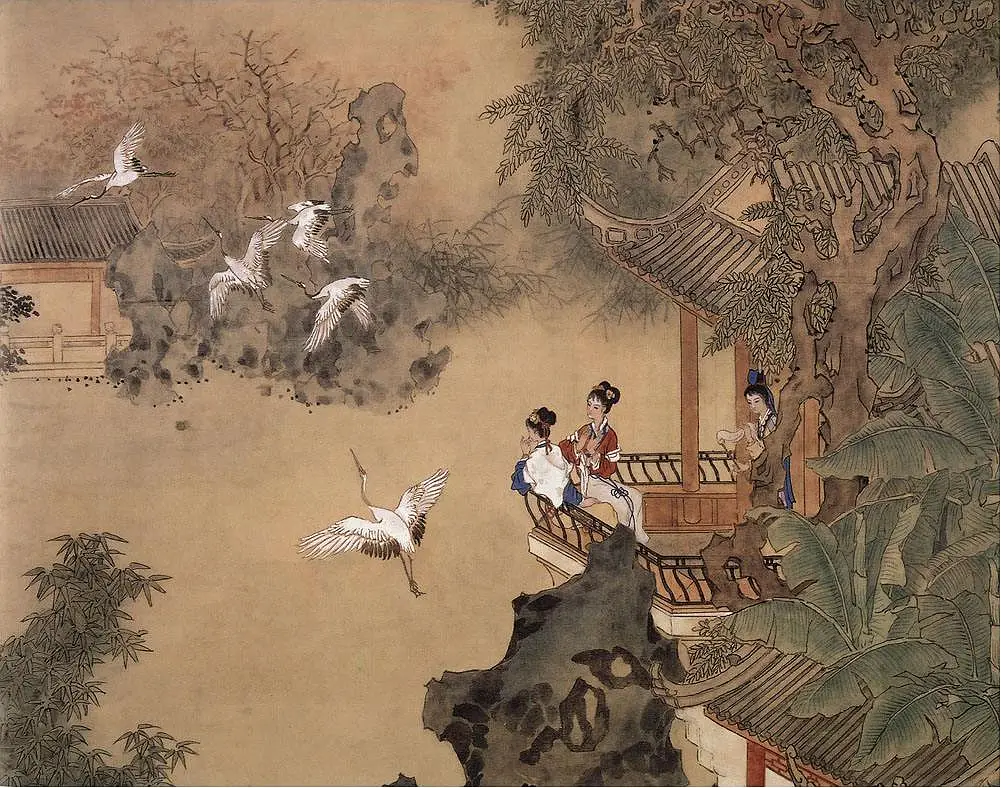During the Liu Song period of the Southern and Northern Dynasties, Zhao Wenshao(趙文韶), a native of Kuaiji (modern-day Shaoxing, Zhejiang Province), served as an attendant in the Crown Prince’s palace in the capital city (present-day Nanjing). He lived near the foot of Purple Mountain by the Qingxi River, at Zhongqiao. His residence was separated from the house of the Minister Wang Shuqing by only a narrow lane, approximately two hundred steps away.
On a clear autumn night illuminated by the bright moonlight, Zhao Wenshao, gazing at the full moon, was overwhelmed with intense homesickness. Leaning against his own door frame, he began to sing the song “The Crow Flies Westward,”(《西夜烏飛》) his voice sorrowful and plaintive.
While singing, he suddenly saw a maid, about fifteen or sixteen years old, dressed in green approaching him.
“The lady of the Wang family sent me to ask if you, feeling lonely singing here alone, would be willing to join us in a game of chasing the moon?” Said the maid.
At that moment, with voices still audible around, Zhao Wenshao harbored no suspicion toward the newcomer. Thus, he politely replied to the maiden in green and accepted the invitation from the lady of the Wang family.
Before long, the lady of the Wang family arrived. She was around eighteen or nineteen, graceful in her movements and exceedingly lovely in appearance, accompanied by two maids. Zhao Wenshao inquired about her residence, and she gestured towards Minister Wang’s house.
She said to Zhao Wenshao, “I came because I heard your singing. Could I have another song?”
So Zhao Wenshao sang another piece, “Grass Grows on the Plateau.”(《草生盤石》) His singing was clear, melodious, and resonated deeply with the lady’s sentiments.
Sensing a faint trace of loneliness and sorrow in his song, she told Zhao Wenshao, “With a bottle in hand, who would fear a lack of water?” Then she instructed her maidservant, “Go fetch the kōng hóu (箜篌, a traditional Chinese instrument) and let me play a tune for our attendant.”
Before long, kōng hóu arrived, and the lady played a few notes, the sound pure and hauntingly sorrowful. She ordered her maid to sing “Frost on the Leaves,”(《繁霜》) while she herself loosened her waistband and tied kōng hóu around her waist, playing it in harmony with her singing.
“At dusk, the wind blows, leaves fall upon the branches. My heartfelt thoughts, the worry you do not know. Singing ‘Frost on the Leaves,’ invading the dawn’s curtain. Why linger together in vain, sitting and awaiting the falling frost. ” (曰暮風吹,葉落依枝。丹心寸意,愁君未知。歌《繁霜》,侵曉幕。何意空相守,坐待繁霜落。)
Once the song concluded, it was deep into the night. The lady stayed and embraced Zhao Wenshao, sleeping together until the fourth watch before departing gracefully. Upon leaving, she removed a golden hairpin and gave it to Zhao Wenshao, who, in return, presented her with a silver bowl and a white crystal spoon.
After daybreak, Zhao Wenshao ventured outside and coincidentally arrived at the Qingxi Temple to rest. Suddenly, he noticed the silver bowl he had gifted the woman placed on the temple’s altar. Bewildered, he turned and found the white crystal spoon behind a screen, along with the kōng hóu played by the woman the previous night, still with its waistband tied the same way.
In the temple, there was only the statue of the Clear Creek Maiden(女姑神), with a green-clad maid standing before it. Zhao Wenshao examined closely and recognized both of them as the individuals from the previous night.
From that day onward, the statue of the Clear Creek Maiden in the temple vanished. This incident occurred in the fifth year of the Song Yuanjia era.
illust: Peng Lianxi
Original text in 《續齊諧記》:
會稽趙文韶,為東宮扶侍,坐清溪中橋,與尚書王叔卿家隔一巷,相去二百步許。秋夜嘉月,悵然思歸,倚門唱《西夜烏飛》,其聲甚哀怨。忽有青衣婢,年十五六,前曰:「王家娘子白扶侍,聞君歌聲,有門人逐月遊戲,遣相聞耳。」時未息,文韶不之疑,委曲答之,亟邀相過。須臾,女到,年十八九,行步容色可憐,猶將兩婢自隨。問:「家在何處?「舉手指王尚書宅,曰:「是聞君歌聲,故來相詣,豈能為一曲邪?」文韶即為歌《草生盤石》,音韻清暢,又深會女心。乃曰:「但令有瓶,何患不得水?」顧謂婢子:「還取箜篌,為扶侍鼓之。」須臾至,女為酌兩三彈,泠泠更增楚絕。乃令婢子歌《繁霜》,自解裙帶系箜篌腰,叩之以倚歌。歌曰:「曰暮風吹,葉落依枝。丹心寸意,愁君未知。歌《繁霜》,侵曉幕。何意空相守,坐待繁霜落。」歌闋,夜已久,遂相佇燕寢,竟四更別去。脫金簪以贈文韶,文韶亦答以銀碗白琉璃匕各一枚。既明,文韶出,偶至清溪廟歇,神坐上見碗,甚疑;而委悉之屏風後,則琉璃匕在焉,箜篌帶縛如故。祠廟中惟女姑神像,青衣婢立在前,細視之,皆夜所見者,於是遂絕。當宋元嘉五年也。


Comments are closed.